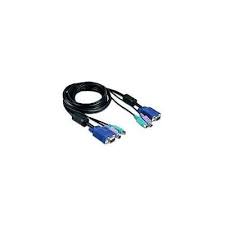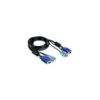D-Link DKVM-CB KVM Switch Cable
D-Link DKVM-CB KVM Switch Cable provides essential connectivity between computers and D-Link KVM switches, combining video, keyboard, mouse, and audio connections into a single integrated cable assembly. This specialized cable eliminates installation complexity by bundling multiple connection types, enabling efficient multi-computer control through a centralized switching system without cable management challenges.
Unlike standard computer cables that require separate video, USB, and audio connections, this purpose-built KVM cable streamlines professional installations where multiple computers share common peripherals. The cable maintains signal integrity across all connection types while providing the reliability required for business environments, server rooms, and technical workstations where system access cannot be compromised.
Cable Architecture and Connection Specifications
Integrated Multi-Signal Design
The D-Link DKVM-CB KVM Switch Cable incorporates multiple connection technologies within a unified cable structure:
- VGA video transmission: High-quality analog video signal support for resolutions up to 1920×1200
- PS/2 keyboard interface: Dedicated keyboard connection ensuring reliable input response
- PS/2 mouse connectivity: Precise mouse control with full compatibility across operating systems
- Audio signal routing: Microphone and speaker connections for complete multimedia switching
Connector Configuration and Compatibility
Specialized connector arrangement optimizes compatibility with D-Link KVM infrastructure:
- Computer-side connections: Standard VGA, PS/2, and audio jacks matching typical computer port layouts
- KVM switch interface: Proprietary connector designed for specific D-Link KVM switch models
- Secure connection mechanisms: Locking connectors prevent accidental disconnection during operation
- Gold-plated contacts: Corrosion-resistant connections maintain signal quality over extended periods
Technical Performance and Signal Quality
Video Signal Transmission Characteristics
Analog video performance ensures clear display quality across supported resolutions:
- Maximum resolution support: 1920×1200 at 60Hz with crisp image reproduction
- Bandwidth specifications: Adequate frequency response for professional graphics applications
- Signal degradation resistance: Shielded construction minimizes interference and cross-talk
- Color accuracy maintenance: Impedance-matched conductors preserve color fidelity
Input Device Communication Standards
Keyboard and mouse connectivity provides responsive user interaction:
- PS/2 protocol support: Native PS/2 communication ensures compatibility with all operating systems
- Scan code transmission: Direct keyboard scan code relay without translation delays
- Mouse precision: High-resolution mouse movement tracking without signal loss
- Hot-key functionality: Support for KVM switch control through keyboard combinations
KVM Switch Integration and System Compatibility
D-Link KVM Switch Optimization
Engineered specifically for seamless integration with D-Link KVM switching equipment:
- Model-specific compatibility: Designed for particular D-Link KVM switch series with matching connector requirements
- Plug-and-play operation: Immediate recognition and configuration with compatible D-Link models
- Switch control integration: Supports advanced switching features and OSD menu navigation
- Firmware compatibility: Tested with current and legacy D-Link KVM switch firmware versions
Multi-Platform Operating System Support
Comprehensive compatibility across diverse computing environments:
- Windows systems: Full compatibility from Windows 95 through current Windows 11 versions
- Unix and Linux: Native PS/2 support ensures reliable operation across all distributions
- macOS integration: Works with Mac systems equipped with appropriate video and input ports
- Embedded systems: Compatible with industrial computers and specialized equipment
Installation Procedures and Cable Management
Physical Installation Process
Setting up the D-Link DKVM-CB KVM Switch Cable requires systematic connection procedures:
- Power system shutdown: Safely power down connected computers before cable installation
- Computer connections: Attach VGA, PS/2, and audio connectors to respective computer ports
- KVM switch connection: Secure cable to designated port on compatible D-Link KVM switch
- Connection verification: Power systems and test all input/output functionality
Professional Cable Management Practices
Proper installation techniques ensure reliable long-term operation:
- Cable routing planning: Design pathways that minimize interference and mechanical stress
- Bend radius compliance: Maintain manufacturer-specified minimum bend radius throughout installation
- Electromagnetic interference avoidance: Route away from power cables and high-frequency equipment
- Documentation practices: Label connections and maintain installation records for future maintenance
Professional Applications and Use Cases
Enterprise Server Management
The D-Link DKVM-CB KVM Switch Cable serves critical roles in professional IT infrastructure:
- Data center operations: Centralized server console access for system administration and maintenance
- Network operations centers: Multi-system monitoring and management from single workstation
- Server room installations: Space-efficient control of multiple rack-mounted servers
- Emergency system access: Reliable connectivity during network failures or remote access issues
Technical Development Environments
Development and testing scenarios benefit from multi-system control capabilities:
- Multi-platform development: Access different operating systems and development environments
- Quality assurance testing: Switch between test systems and production environments
- System integration labs: Control multiple systems during integration and compatibility testing
- Training facilities: Instructor control of multiple student systems or demonstration equipment
Cable Length and Installation Flexibility
Standard Cable Length Considerations
The cable length provides practical benefits for typical professional installations:
- Equipment rack compatibility: Appropriate length for standard server rack and console arrangements
- Workspace organization: Sufficient reach for organized cable management without excessive slack
- Signal integrity optimization: Length balanced to maintain video quality and input responsiveness
- Installation flexibility: Adequate reach for various equipment layout configurations
Physical Installation Environments
Optimal performance occurs within specific installation parameters:
- Temperature-controlled environments: Designed for standard office and server room conditions
- Professional equipment racks: Compatible with 19-inch rack systems and console arrangements
- Clean electromagnetic environments: Performance optimized for controlled RF interference levels
- Accessible installation locations: Requires reasonable access for connection and maintenance procedures
Maintenance and Reliability Considerations
Preventive Maintenance Requirements
Regular maintenance procedures ensure continued reliable operation:
- Connection inspection: Periodic verification of secure connector attachment and contact condition
- Cable condition assessment: Visual inspection for physical damage, wear, or environmental degradation
- Signal quality monitoring: Regular testing of video clarity and input device responsiveness
- Environmental monitoring: Verification of operating conditions within manufacturer specifications
Troubleshooting Common Issues
Systematic approaches to resolving typical operational problems:
- Video display problems: Connector reseating, cable routing verification, and resolution compatibility checks
- Keyboard input failures: PS/2 connection verification and keyboard compatibility assessment
- Mouse operation issues: Connection security and mouse sensitivity adjustment procedures
- Audio switching problems: Jack insertion verification and audio system configuration review
Limitations and Technology Constraints
Technical Boundaries and Restrictions
The D-Link DKVM-CB KVM Switch Cable operates within specific technological parameters:
- VGA video limitations: Analog video technology restricts maximum resolution and digital display compatibility
- PS/2 input requirements: Limited to computers and peripherals supporting PS/2 interface standards
- KVM switch dependency: Requires compatible D-Link KVM switch for proper operation
- Single cable per port: Each computer connection requires dedicated cable for KVM switch integration
Alternative Solutions for Different Requirements
Understanding when alternative connectivity solutions provide superior functionality:
- Digital video requirements: HDMI, DisplayPort, or DVI cables for high-resolution digital displays
- USB input preferences: USB-based KVM cables for modern peripheral compatibility
- Extended distance needs: Active signal repeaters or fiber optic solutions for longer installations
- Advanced switching features: Network-based KVM solutions for remote access and management
Cost-Effectiveness and Professional Value
Investment Analysis for Business Environments
This cable provides essential connectivity for professional KVM installations:
- Infrastructure efficiency: Single cable replaces multiple individual connections reducing complexity
- Reliability focus: Professional-grade construction ensures minimal downtime and maintenance
- Compatibility assurance: Guaranteed operation with matching D-Link KVM equipment
- Professional installation: Suitable for both internal IT staff and professional installation services
Long-Term Technology Planning
Evaluating the cable’s role within evolving technology infrastructures:
- Legacy system support: Continued relevance for older servers and systems requiring PS/2 connectivity
- Transition planning: Understanding migration paths to newer digital video and USB standards
- Equipment lifecycle alignment: Cable replacement timing coordinated with KVM switch upgrades
- Backup connectivity: Permanent value as emergency or secondary system access solution
System Requirements and Compatibility Specifications
Computer System Prerequisites
Connected systems must meet specific technical requirements:
- VGA video output: Computer graphics cards or integrated video with analog VGA capability
- PS/2 interface ports: Dedicated PS/2 keyboard and mouse ports on computer systems
- Audio connectivity: Standard 3.5mm microphone and speaker jacks for audio switching
- Port accessibility: Physical access to required ports for cable connection procedures
Environmental Operating Parameters
- Operating temperature range: Suitable for typical office and data center environments
- Humidity tolerance: Designed for controlled indoor humidity levels
- Electromagnetic compatibility: Functions reliably in standard business equipment environments
- Physical protection requirements: Requires protection from excessive mechanical stress and environmental contamination
Support and Documentation Resources
Technical Support Infrastructure
D-Link provides comprehensive support for professional installations:
- Installation documentation: Detailed setup guides and compatibility matrices
- Technical support services: Professional assistance for complex installations and troubleshooting
- Warranty coverage: Standard manufacturer warranty protects against defects and premature failure
- Replacement availability: Ongoing availability ensures continuity for existing installations
Professional Installation Services
Expert installation ensures optimal performance and reliability:
- Certified technician installation: Professional setup services for complex multi-system environments
- System integration support: Assistance with broader KVM infrastructure design and implementation
- Training services: User education for efficient KVM switch operation and maintenance
- Ongoing support contracts: Maintenance agreements for critical business applications


 No products in the cart.
No products in the cart. 
Reviews
There are no reviews yet.